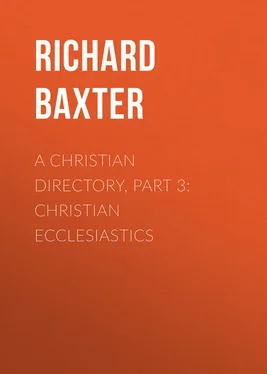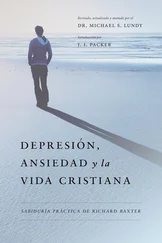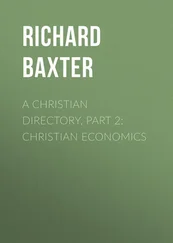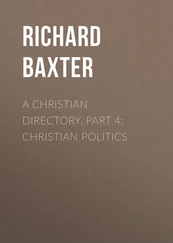Richard Baxter - A Christian Directory, Part 3 - Christian Ecclesiastics
Здесь есть возможность читать онлайн «Richard Baxter - A Christian Directory, Part 3 - Christian Ecclesiastics» — ознакомительный отрывок электронной книги совершенно бесплатно, а после прочтения отрывка купить полную версию. В некоторых случаях можно слушать аудио, скачать через торрент в формате fb2 и присутствует краткое содержание. Жанр: foreign_antique, foreign_prose, на английском языке. Описание произведения, (предисловие) а так же отзывы посетителей доступны на портале библиотеки ЛибКат.
- Название:A Christian Directory, Part 3: Christian Ecclesiastics
- Автор:
- Жанр:
- Год:неизвестен
- ISBN:нет данных
- Рейтинг книги:3 / 5. Голосов: 1
-
Избранное:Добавить в избранное
- Отзывы:
-
Ваша оценка:
- 60
- 1
- 2
- 3
- 4
- 5
A Christian Directory, Part 3: Christian Ecclesiastics: краткое содержание, описание и аннотация
Предлагаем к чтению аннотацию, описание, краткое содержание или предисловие (зависит от того, что написал сам автор книги «A Christian Directory, Part 3: Christian Ecclesiastics»). Если вы не нашли необходимую информацию о книге — напишите в комментариях, мы постараемся отыскать её.
A Christian Directory, Part 3: Christian Ecclesiastics — читать онлайн ознакомительный отрывок
Ниже представлен текст книги, разбитый по страницам. Система сохранения места последней прочитанной страницы, позволяет с удобством читать онлайн бесплатно книгу «A Christian Directory, Part 3: Christian Ecclesiastics», без необходимости каждый раз заново искать на чём Вы остановились. Поставьте закладку, и сможете в любой момент перейти на страницу, на которой закончили чтение.
Интервал:
Закладка:
Direct. VII. No man should pretend danger or scruple against his renewing the vow of christianity, or any one essential part of it; viz. To take God the Father, Son, and Holy Ghost for my God, and Saviour, and Sanctifier, my Owner, Governor, and Father; renouncing the devil, the world, and the flesh. Because there is an absolute necessity, præcepti et medii , of performing this, and he that doth it not shall certainly be damned; and therefore no worse matter can stand up against it: he that denieth it, giveth up himself despairingly to damnation. Yet I have heard many say, I dare not promise to turn to God, and live a holy life, lest I break this promise, and be worse than before. But dost thou not know, that it must be both made and kept, if thou wilt be saved? Wilt thou choose to be damned, for fear of worse? There is but one remedy for thy soul, and all the hope of thy salvation lieth upon that alone. And wilt thou refuse that one, for fear lest thou cast it up and die? when thou shalt certainly die unless thou both take it, and keep it, and digest it.
Direct. VIII. About particular sins and duties, deliberate resolutions are the ordinary means of governing our lives; and vows must not be used where these will do the work without them. For extraordinary means must not be used, when ordinary will serve the turn. Nor must you needlessly draw a double guilt upon yourselves in case of sinning. And in mutable or doubtful cases, a resolution may be changed, when a vow cannot. Try therefore what deliberate resolutions will do, with the help of other ordinary means, before you go any further.
Direct. IX. When ordinary resolutions and other helps will not serve the turn, to engage the will to the forbearance of a known sin, or the performance of a known duty, but temptations are so strong as to bear down all, then it is seasonable to bind ourselves by a solemn vow, so it be cautelously and deliberately done, and no greater danger like to follow. In such a case of necessity, 1. You must deliberate on the benefits and need. 2. You must foresee all the assaults that you are like to have to tempt you to perjury, that they come not unexpected. 3. You must join the use of all other means for the keeping of your vows.
Direct. X. Make not a law and religion to yourselves by your voluntary vows, which God never made you by his authority; nor bind yourselves for futurity to all that is a duty at present, where it is possible that the change of things may change your duty. God is our King and Governor, and not we ourselves: it is not we, but he, that must give laws to us. We have work enough to do of his appointing; we need not make more to ourselves, as if he had not given us enough. Vows are not to make us new duties or religions, but to further us in the obedience of that which our Lord hath imposed on us. It is a self-condemning sin of foolish will-worshippers, to be busy in laying more burdens on themselves, when they know they cannot do so much as God requireth of them. Yea, some of them murmur at God's laws as too strict, and at the observers of them as too precise, (though they come far short of what is their duty,) and yet will be cutting out more work for themselves.
And it is not enough that what you vow be your duty at the present, but you must bind yourselves to it by vows no longer than it shall remain your duty. It may be your duty at the present to live a single life; but if you will vow therefore that you will never marry, you may bind yourselves to that which may prove your sin: you know not what alterations may befall you in your body or estate, that may invite you to it. Are you sure that no change shall make it necessary to you? Or will you presume to bind God himself by your vows, that he shall make no such alteration? Or if you were never so confident of your own unchangeableness, you know not what fond and violent affections another may be possessed with, which may make an alteration in your duty. At the present it may be your duty to live retiredly, and avoid magistracy and public employments: but you may not vow it therefore for continuance; for you know not but God may make such alterations, as may make it so great and plain a duty, as without flat impiety or cruelty, you cannot refuse. Perhaps at the present it may be your duty to give half your yearly revenues to charitable and pious uses: but you must not therefore vow it for continuance (without some special cause to warrant it); for perhaps the next year it may be your duty to give but a fourth or a tenth part, or none at all, according as the providence of God shall dispose of your estate and you. Perhaps God may impose a clear necessity on you, of using your estate some other way.
Direct. XI. If you be under government, you may not lawfully vow without your governors' consent, to do any thing which you may not lawfully do without their consent, in case you had not vowed it. For that were, 1. Actually to disobey them at the present, by making a vow without the direction and consent of your governors. 2. And thereby to bind yourselves to disobey them for the future, by doing that without them, which you should not do without them. But if it be a thing that you may do, or must do, though your governors forbid you, then you may vow it though they forbid you (if you have a call from the necessity of the vow).
Direct. XII. If oaths be commanded us by usurpers that have no authority to impose them, we must not take them in formal obedience to their commands. For that were to own their usurpation and encourage them in their sin. If we owe them no obedience in any thing, we must not obey them in so great a thing: or if they have some authority over us in other matters, but none in this, (as a constable hath no power to give an oath,) we must not obey them in the point where they have no authority. But yet it is possible that there may be other reasons that may make it our duty to do it, though not as an act of formal obedience: as I may take an oath when a thief or murderer requireth it, not to obey him, but to save my life. And if any man command me to do that which God commandeth me, I must do it, because God commandeth it.
Direct. XIII. If a lawful magistrate impose an oath or vow upon you, before you take it you must consult with God, and know that it is not against his will. God must be first obeyed in all things; but especially in matters of so great moment, as vows and promises.
Quest. I. What if I be in doubt whether the oath or promise imposed be lawful? must I take it, or not? If I take an oath which I judge unlawful or false, I am a perjured or profane despiser of God: and if a man must refuse all oaths or promises, which the magistrate commandeth, if he do but doubt whether they be lawful, then government and justice will be injured, while every man that hath ignorance enough to make him dubious, shall refuse all oaths and promises of allegiance, or for witness to the truth.
Answ. I. I shall tell you what others say first in the case of doubting. Dr. Sanderson saith, Prælect. iii. sect. 10, p. 74, 75, Tertius casus est cum quis juramento pollicetur se facturum aliquid in se fortassis licitum, quod tamen ipse putat esse illicitum. Ut siquis ante hæc tempora admittendus ad beneficium (ut vocant) ecclesiasticum, promisisset in publicis sacris observare omnes ritus legibus ecclesiasticis imperatos; vestem scilicet lineam, crucis signum ad sacrum fontem, ingeniculationem in percipiendis symbolis in sacra cœna, et id genus alios; quos ipse tamen ex aliquo levi prejudicio putaret esse superstitiosos et papisticos: quæritur in hoc casu quæ sit obligatio? Pro Resp. dico tria: Dico 1. Non posse tale juramentum durante tali errore sine gravi peccato suscipi. Peccat enim graviter qui contra conscientiam peccat, etsi erroneam. Judicium enim intellectus cum sit unicuique proxima agendi regula; voluntas, si judicium illud non sequatur, deficiens a regula sua, necesse est ut in obliquum feratur. Tritum est illud, Qui facit contra conscientiam ædificat ad gehennam. Sane qui jurat in id quod putat esse illicitum, nihilominus juraturus esset, si esset revera illicitum: atque ita res illa, ut ut alii licita, est tamen ipsi illicita: sententiam ferente apostolo, Rom. xiv. 14, &c. Dico 2. Tale juramentum non obligare, &c. – That is, The third case is, when a man promiseth by oath that he will do a thing which in itself perhaps is lawful, but he thinketh to be unlawful: as if one before these times being to be admitted to an ecclesiastical benefice, (as they call it,) had promised, that in public worship he would observe all the rites commanded in the ecclesiastic laws, to wit, the surplice, the sign of the cross at the sacred font, kneeling in the receiving of the symbols in the holy supper, and others the like; which yet out of some light prejudice, he thought to be superstitious and papistical. The question is, what obligation there is in this case? For answer I say three things: 1. I say that an oath, while such an error lasteth, cannot be taken without grievous sin; for he grievously sinneth, who sinneth against his conscience, although it be erroneous. For when the judgment of the intellect is to every man the nearest rule of action, it must be that the will is carried into obliquity, if it follow not that judgment, as swerving from its rule. It is a common saying, He that doth against his conscience, buildeth unto hell: verily he that sweareth to that which he thinketh to be unlawful, would nevertheless swear if it were indeed unlawful. And so the thing, though lawful to another, is to him unlawful, the apostle passing the sentence, Rom. xiv. 14, &c. 2. I say, that such an oath bindeth not, &c. – Of the obligation I shall speak anon; 52 52 See before, chap. iii. gr. direct. 10.
but of the oath or promise, I think the truth lieth here as followeth.
Интервал:
Закладка:
Похожие книги на «A Christian Directory, Part 3: Christian Ecclesiastics»
Представляем Вашему вниманию похожие книги на «A Christian Directory, Part 3: Christian Ecclesiastics» списком для выбора. Мы отобрали схожую по названию и смыслу литературу в надежде предоставить читателям больше вариантов отыскать новые, интересные, ещё непрочитанные произведения.
Обсуждение, отзывы о книге «A Christian Directory, Part 3: Christian Ecclesiastics» и просто собственные мнения читателей. Оставьте ваши комментарии, напишите, что Вы думаете о произведении, его смысле или главных героях. Укажите что конкретно понравилось, а что нет, и почему Вы так считаете.












